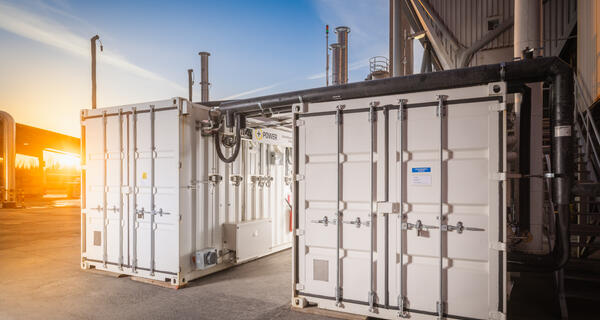
Fortum is launching a pilot at its waste incineration plant in Riihimäki with the aim of capturing the plant’s CO2 emissions and utilizing them as raw materials in the production of new high-quality materials such as plastic. The Carbon2x concept can significantly reduce the climate impacts of waste incineration and double the recycling rate of plastic packaging in Finland.
Fortum’s Recycling and Waste business aims to significantly improve the circulation of materials in waste streams using next-generation circular economy solutions. In Europe, the green transition is gaining speed, and there will be plenty of clean energy available. At the same time, there will be a dire shortage of valuable raw materials. Therefore, recycling must be reimagined as well.
In addition to the energy produced by waste incineration, in the future Fortum will focus more on producing valuable materials from the recycling process.
“We have worked with different material flows for a long time already and at Fortum, we believe that we can further improve recycling. Following nature’s example, the industry must learn to become considerably more efficient in carbon recycling. The Carbon2x concept considers carbon dioxide a valuable raw material that can be used to produce new materials. Simultaneously, we can reduce the dependence on fossil feedstock and improve self-sufficiency in Europe,” states Kalle Saarimaa, Vice President of Recycling & Waste at Fortum.
Europe produces almost 100 million tonnes of waste that is converted into energy by incineration. The incineration of non-recyclable waste is an important part of the current waste disposal system and energy production, but it also produces harmful CO2 emissions. At the same time, the waste also includes vast amounts of carbon, which is a valuable raw material when utilized correctly. The carbon from waste cannot be recycled adequately using the current mechanical methods that are based on separate collection and the purification of materials.
Carbon2x – Moving towards the next generation of circular economy
As a strategic programme of Fortum’s Recycling and Waste business, Carbon2x can help the company reduce the CO2 emissions of its waste treatment operations significantly and produce high-quality raw materials for new products.
“At the first stage of the pilot that begins in Riihimäki in the spring of 2022, the carbon dioxide captured from the end of the plant’s chimney will be combined with hydrogen to produce methane. However, we consider the production of methane to be merely an intermediate phase, as our deeper interest lies in the production of products that are of higher degree of quality, like specialty plastics,” says Tony Rehn, Carbon2x program director at Fortum.
In addition to Finland, Fortum has waste incineration plants in Denmark and Sweden. Next to these, the company plans to start waste incineration operations in the UK as well. These plants are also aiming for carbon capture and further processing of the CO2 emissions and utilizing them as raw materials in the future. At these other facilities, Fortum is looking to test existing suitable technologies. “In Denmark, for example, we are researching the refining of methanol with existing technology, but in Riihimäki we are refining methane with a completely new way, with new technology,” Saarimaa says.
In addition to Fortum, in Europe alone there are hundreds of other companies with waste incineration plants that could adopt the Carbon2x concept.
Carbon recycling is the most efficient way to produce climate-friendly plastic
According to research, the global demand for plastics is expected to grow threefold by 2050, and there are still very few worthy alternatives to plastic in many industries such as pharmaceutical and food industry. Today, 90% of plastics is produced from fossil feedstock such as oil. To combat climate change, reducing the use of virgin fossil feedstock is of vital importance. To achieve this, new solutions are needed to complement mechanical recycling. Capturing and recycling carbon from waste incineration as new raw materials form a part of this solution.
“According to our initial analysis, up to 90% of the carbon from waste could be circulated by supplementing the mechanical recycling of plastic with waste incineration technology, which captures the CO2 emissions and utilizes them in the production of new materials. As a result, the climate impact of waste incineration would become net negative, and the recycling rate of plastic packaging in Finland could be doubled compared to the current level by 2030,” states Saarimaa.
The production of CO2-based materials starts from the premise of using zero-emission electricity such as renewable energy sources or nuclear power. Fortum is in a good position to develop the Carbon2x concept, as the company can offer plenty of clean electricity as well as comprehensive recycling solutions to process the ash from waste incineration. These solutions also have a significant role in minimizing climate impacts and increasing the circulation of materials.
The Carbon2x programme promotes Fortum’s objective to be carbon neutral in its European power generation in 2035.
Read more about the Carbon2x concept on Fortum’s website.
Fortum
Fortum and Uniper form a European energy group committed to enabling a successful transition to carbon neutrality for everyone. Our 50 gigawatts of power generating capacity, substantial gas import and storage operations, and our global energy trading business enable us to provide Europe and other regions with a reliable supply of low-carbon energy. We are already Europe’s third largest producer of CO2-free electricity, and our growth businesses focus on clean power, low-carbon energy, and the infrastructure for tomorrow’s hydrogen economy. In addition, we design solutions that help companies and cities reduce their environmental footprint. Our 20,000 professionals and operations in 40 countries give us the skills, resources, and reach to empower the energy evolution toward a cleaner world.